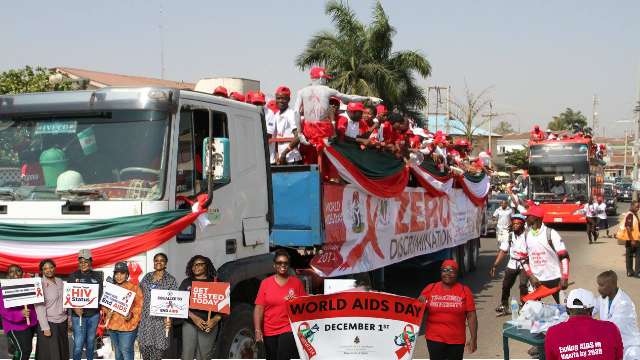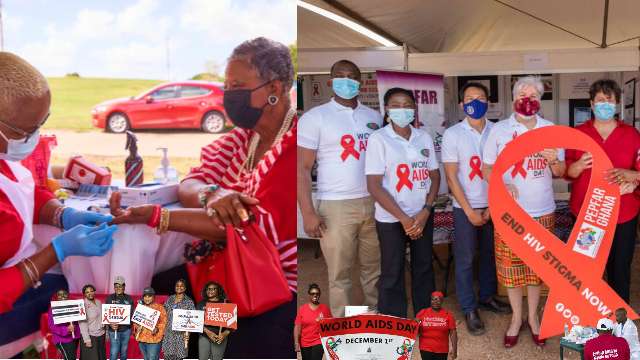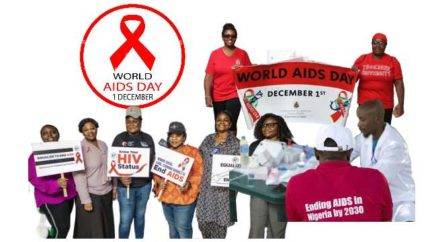Nigeria, on this World AIDS Day, embraces the global theme “Let Communities Lead” in its fight against HIV/AIDS. Recognizing the critical role of local communities, the World Health Organization emphasizes their pivotal involvement in curbing new HIV infections. World AIDS Day was first observed on December 1, 1988, making 2023 its 35th anniversary. It was established by the World Health Organization (WHO) as a response to the rising global epidemic of HIV/AIDS.
Partnering with state and federal authorities and NGOs, these communities serve as the bedrock for essential prevention, testing, and treatment services. Their engagement fosters trust, innovation, policy monitoring, and accountability in healthcare delivery. However, despite progress, there’s a pressing need to bolster community-driven initiatives to expand access to antiretroviral therapy (ART) and bridge the gap between the infected population and available treatment.
However the recent surge of the disease in Nigeria must be a serious concern for major stakeholders in the health sector. It was reported that Kano state new infection figure was 4728.This figure was discovered as a result of compulsory HIV test for pregnant women . while Anambra state new infection figure is mind-blowing, this situation had given insight how the disease is gradually entrenching itself in the society as a result of government and other stakeholders loosing guard on the disease
World AIDS Day: Symbolism, Global Observance, Awareness and Education
World AIDS Day is observed annually on December 1st and serves as a global awareness campaign to unite people worldwide in the fight against HIV, show support for those living with HIV, and remember those who have died from AIDS-related illnesses. Here’s a brief history of World AIDS Day.The day is symbolized by the use of the red ribbon, which became an international symbol of HIV awareness and support. The red ribbon campaign was launched by the Visual AIDS Artists Caucus in 1991.

The day is symbolized by the use of the red ribbon, which became an international symbol of HIV awareness and support. The red ribbon campaign was launched by the Visual AIDS Artists Caucus in 1991.
World AIDS Day is observed globally, and each year there is a specific theme to focus on various aspects of the epidemic, such as prevention, treatment, and support for those living with HIV/AIDS.
The day is marked by various events, activities, and campaigns aimed at raising awareness about HIV/AIDS, promoting education on prevention and treatment, and challenging the stigma and discrimination associated with the disease.
Challenges and Imperatives in the Nigerian Context
As of 2021, Nigeria housed 1.9 million individuals living with HIV, with women and children under 14 bearing a substantial burden. While ART coverage expanded from 340,000 in 2010 to 1.46 million in 2020, access remains limited for a significant portion of the affected populace. The United Nations stresses the possibility of eradicating HIV/AIDS by 2030 through sustained interventions but highlights critical impediments. Insufficient resources, waning advocacy, and underrecognized community-led responses threaten Nigeria’s progress. The UNAIDS report underscores the urgent need for increased focus and support for ground-level services and community-led efforts.

Urgent Calls for Revitalized Efforts and Enhanced Accessibility
In light of these challenges, Nigeria’s Agency for the Control of AIDS faces a crucial mandate to revitalize programs and streamline drug accessibility for affected individuals. The nation’s Coordinating Minister for Health, Ali Pate, with his extensive experience in international health programs, is urged to elevate the HIV/AIDS agenda and ensure adequate funding. The revival of awareness campaigns, inclusive stakeholder engagement, and individual responsibility in seeking information and adopting healthy practices are vital components in combatting HIV/AIDS.
Nigeria’s battle against HIV/AIDS necessitates a unified effort, entailing robust community involvement, governmental commitment, and enhanced accessibility to life-saving treatments. On this World AIDS Day, Nigeria stands at a critical juncture, requiring concerted action and renewed determination to achieve the shared goal of ending the HIV/AIDS scourge by 2030.
Table of Contents
Discover more from OGM News NG
Subscribe to get the latest posts sent to your email.














